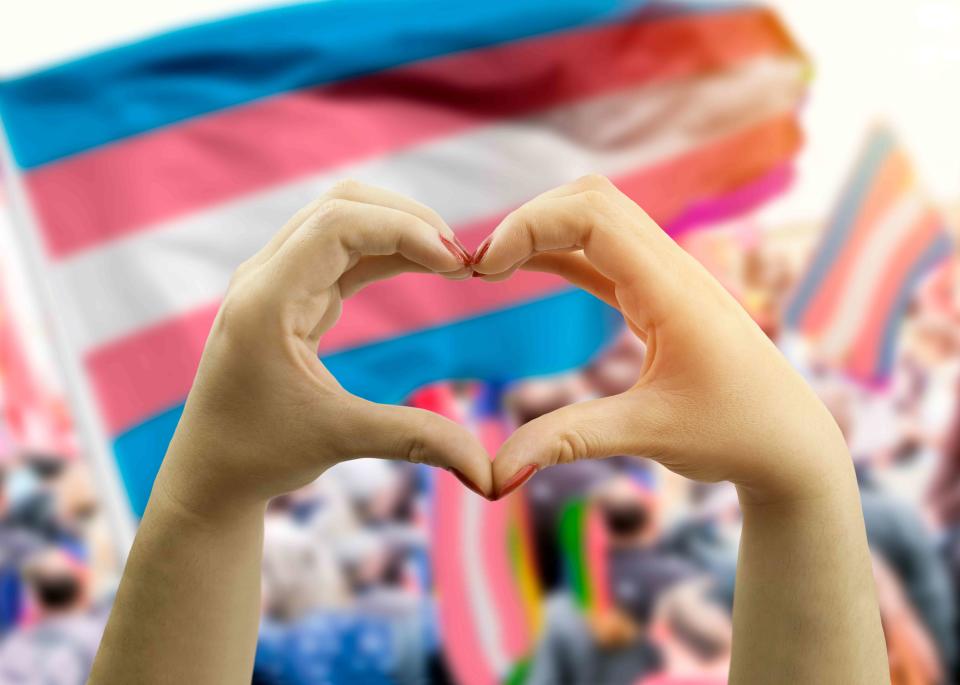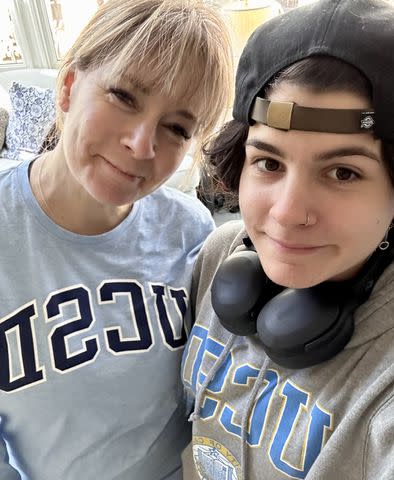8 Things I’ve Learned Parenting a Non-Binary Kid That Might Help You
Former Parents editor Liz Vaccariello shares what she's learned being the parent of a non-binary child.

Cunaplus_M.Faba/Getty Imags
Medically reviewed by Samantha Mann
“I’ve got this,” I thought, sitting on my 14-year-old’s bed when they told me they were gay. After all, I’d been the editor of Parents magazine, a job that exposed me to a deep archive of stories and research concerning LGTBQ+ youth. I had attended several of my company’s Pride events, which featured the voices of parents and experts alike. Our family also had the privilege of living on a diverse street in a liberal town nestled in a progressive area. My homework was done, and I was confident. Let’s do this.
Then, about 18 months later, the two of us were driving to pick up pizza when Olivia said, “Actually, I’ve been thinking a lot, and I don’t identify as male or female. I want to use they/them pronouns.” And a whole new door had opened for our family.
Each parent will acknowledge, react to, and process their child’s coming out differently. Below, I’ll share how I felt parenting my child as they came to know their gender identity. This is not as a guide to follow, but rather a story of one human trying to love and support another human. Ahead, you can find 8 things I learned while parenting my non-binary kid.
Related: What I Wish Parents Would Do When Their Kid Comes Out
It's natural to feel your feelings.
It’s not easy for me to admit that I mourned the loss of my “baby girl” for a few days after our conversation. Tears pricked my eyes while we ate that pizza. In my head and my heart, we were a family of four: mom, dad and identical twin girls. I had thought of Olivia as my daughter for so long that switching gears felt, for a beat, like the death of something.
But it's also possible to change those feelings, too.
While I might have felt that way initially, I quickly came to realize that no one had died. No one had even changed. This was the same bright, sensitive, funny, strong, focused, passionate, kind-hearted child I’d always known. My kid was having the extraordinary experience of understanding themself fully. When I shifted my thinking in that way, I was overwhelmed by admiration for the work they’d done becoming self-aware, and for their courage in coming out.
My partner Steve and I have always been clear on our job: to raise healthy humans with good hearts who have the capacity to live fully and find joy. This was that. The shape of our family wasn’t changing; only the colors were.
It's important to shoulder your mental and emotional labor yourself.
To put it simply: I knew that the work to fully understand what it means to be non-binary was on me. I listened to podcasts and joined the Pride employee group at my company. But what enlightened me most was following helpful non-binary influencers on social media. Hearing their voices was a way to put myself in Liv’s experience without Liv having to teach, share, or talk about their identity constantly.
Related: From Gen Z to Gen X, How Different Generations Talk About Gender Identity
Know that mistakes will happen.
Truth? All these years later, I’m still good for at least one pronoun slip-up or “shh-them” fumble per month. I learned early on that it just makes things awkward to dramatically apologize, shout “they they they,” make sad faces, or repeat how sorry you are. Simply correct yourself by using the right pronoun in the full context. Your over-the-top apologies turn your mistake into your kid’s problem. Now they need to forgive or soothe you. Just say the sentence correctly and move on.

Courtesy Liz Vaccariello
Respect their identity even when they're not listening.
When new acquaintances ask if my twins are boys or girls, I have a boilerplate answer: “They were assigned females at birth. Sophia still identifies as female and Olivia identifies as non-binary and uses they/them pronouns.” It’s more effort, but it’s A) the truth, B) loyal to Liv, and C) helps to educate the world, one person at a time.
I’m often struck by how many people go on to share that someone close to them is also non-binary. The conversations are invariably interesting and rich. Many of us are learning and growing together.
Liz Vaccariello
I know that I can handle everything it takes to make our home my child's safe space.
It’s an evolution—not a destination.
This is not an issue that follows a tidy timeline. Our conversation was never going to be a one-time event that we discussed, dealt with, and filed away. For our family, it was an unfolding of feelings overlapped with questions, and sprinkled with concerns about mental health and safety.
For example, when Olivia announced their gender identity, I wanted to understand when and how the feeling took shape (hard to say). Did they swing from feeling masculine to feeling feminine? (The answer was no). And I peppered them with questions they weren’t necessarily ready to answer, like: "Can I refer to you as my daughter, or should I say something else?"
Their response in that moment was actually, “I haven’t really thought about that. Can I let you know?” And it’s okay not to know, too.
That evolution might continue. Or not.
Three years since our first conversation, I observe that Liv is most happy and confident the more masculine they present: short bushy haircut, deep voice, and a body toned and sculpted by sports and weight lifting. I’ve noticed their friends call them Liv, their girlfriend sometimes calls them “boyfriend,” and just last week, Sophia referred to them as her brother on TikTok.
Steve and I have begun organically using Liv interchangeably with Olivia (they say they don’t mind us using either). We ask when we’re confused, and speak up when we can help. Basically, we await insight, information, and instructions. If they ever want to change their pronouns to he/they or he/him, they’ll let us know. We’re right here.
At the end of the day, none of this is about me.
Would the last few years have been easier for me if I didn’t have to learn so much, mind so many pronouns, or guide so many friends and family members? Sure. But I know one thing deep and truly: My pivot was nothing compared to the months—maybe years—of confusion, passing, and worrying that Olivia has endured. It’s a burden that, as part of a marginalized group, they will likely continue to bear every time they walk into a new room. With that in mind, I know that I can handle everything it takes to make our home their safe space.
Related: Queer Youth Joy Is a Radical Act
For more Parents news, make sure to sign up for our newsletter!
Read the original article on Parents.

